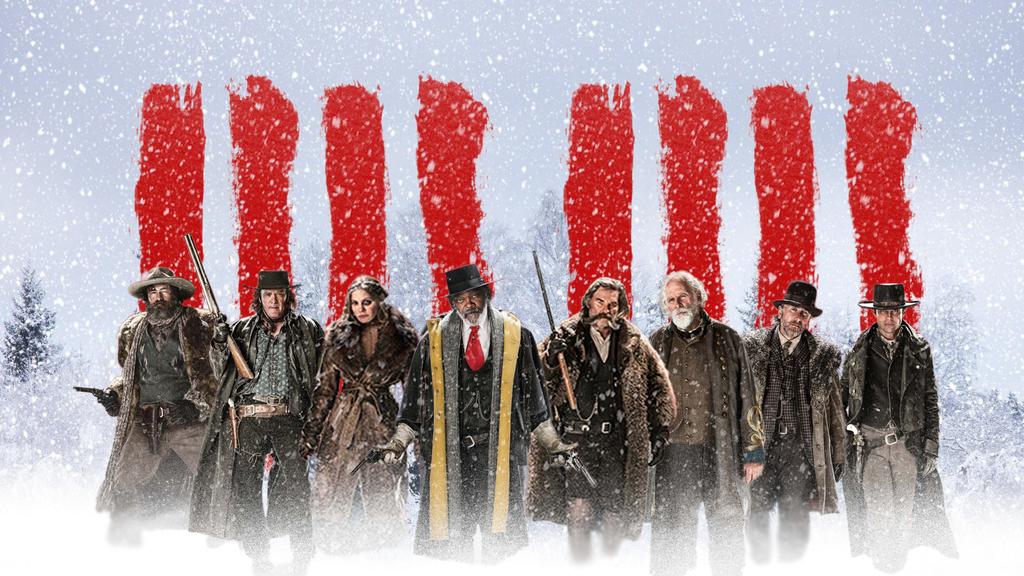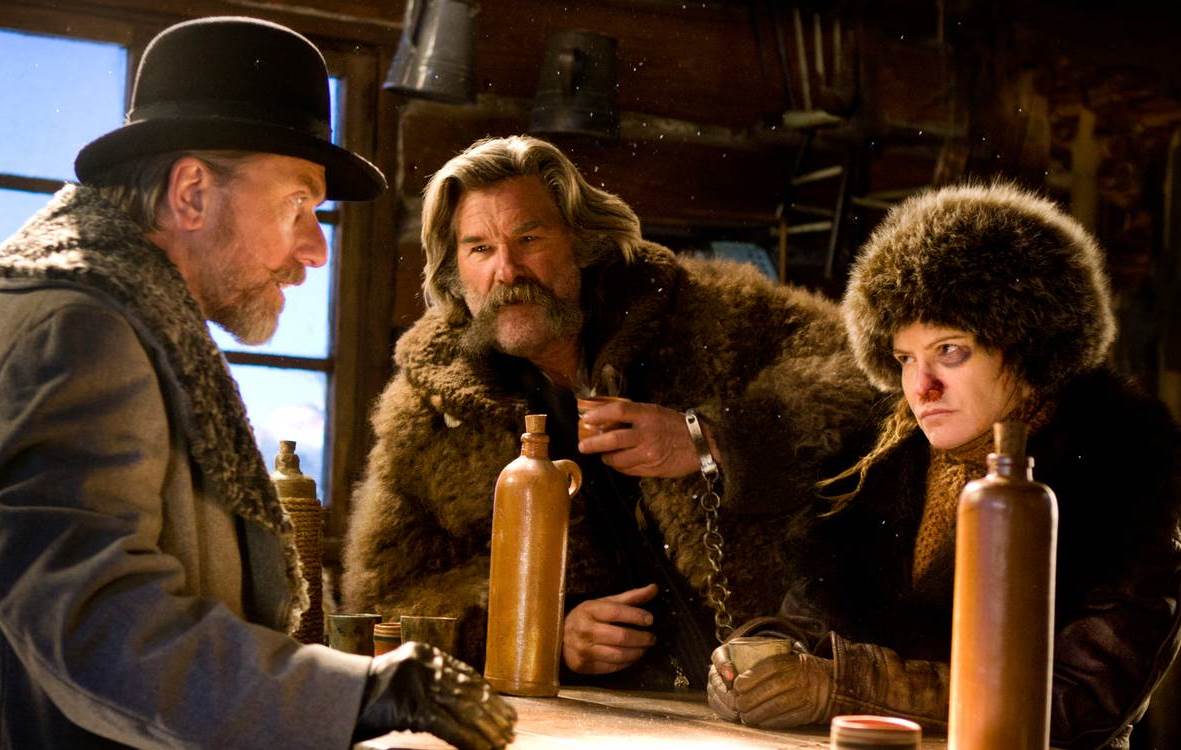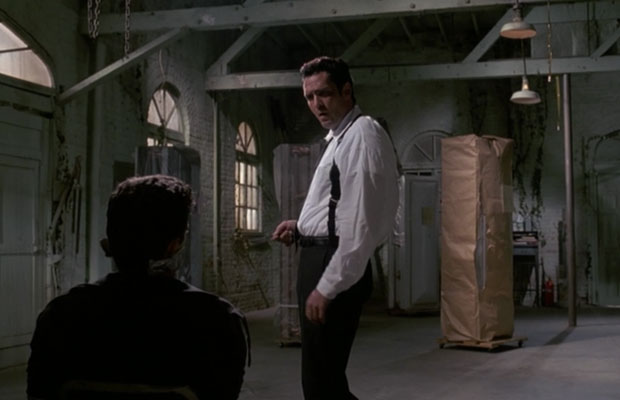"When I elbow you real hard in the face, that means: shut up" - John 'The Hangman' Ruth
After having to wait until January for it to be released in the UK and an extra week to write a review of it on this blog, here are my thoughts on Quentin Tarantino's newest film: The Hateful Eight. Following on from the success of Django Unchained, Tarantino has remained in the Western genre for his newest feature, which is told in six chapters. The film has not been without a troubled release in the US, something which has carried over to the UK with a number of cinema chains having pulled out from exhibiting the film. But is the film itself any good, and can it measure up to Tarantino's other features?
On his way to delivering murderer Daisy Domergue (Jennifer Jason Leigh) to Red Rock, Wyoming, John 'The Hangman' Ruth (Kurt Russell) encounters bounty hunter Major Marquis Warren (Samuel L. Jackson). Also on his way to delivering bounties to Red Rock, Warren joins Ruth in his stagecoach. Along the way they pick up Red Rock's supposed new sheriff, Chris Mannix (Walton Goggins), and are forced to take shelter from a powerful blizzard. Arriving at Minnie's Haberdashery, they meet lodgers Oswaldo Mobray (Tim Roth), Joe Gage (Michael Madsen), Bob (Demian Bichir) and General Sanford Smithers (Bruce Dern). Ruth becomes instantly suspicious of one of the lodgers wanting to free Domergue, and so he and Warren agree to project each other's bounties whilst keeping a lookout for any suspicious activity. Cue the combination of long dialogue scenes and bloody violence in the manner that only Quentin Tarantino knows how to do best, and you have a film that is undeniably his own.
Sadly, my first thought on the film after seeing it was that it is unnecessarily long. At nearly three hours, it is over-stuffed with Tarantino's longest dialogue sequences. This means that there is a big wait before anything of note happens (the end of the third chapter). Normally, I enjoy build up towards the more exciting moments, but the film really loses pace by having the story get really interesting so long into its run-time. The entire second chapter focuses on Mannix's talks with Warren and Ruth, creating a tension between himself and Warren due to their military history. This is further explored in the third chapter, as Mannix bonds with General Sanford. With the third chapter establishing a clear divide between the three characters and having to introduce the other members of The Hateful Eight, the second chapter has the effect of taking up too much of the run-time. The tension between Mannix, Warren and Sanford plays a big part in setting the best parts of the film into motion, and so the second chapter doesn't feel necessary when the third chapter does a good job of portraying this divide. Another problem is the characters themselves, while having good interactions, aren't as charismatic compared to Tarantino's other western, Django Unchained. Granted, The Hateful Eight has a more stage-play style compared to Django, but some of the charm and comedy moments from Django are sorely missing here. There's the occasional laugh, but they are mainly from Samuel L. Jackson towards the end, and the film feels rather empty without this coming from some of the other characters.
On the other hand, there are some enjoyable things about The Hateful Eight as well. Though the characters aren't Tarantino's best, the performances are at least up to his films' usual high standard. Jennifer Jason Leigh has received the most praise of any cast member for her role as Domergue, having been nominated for a Golden Globe and Academy Award for Best Supporting Actress. You can tell she thoroughly enjoyed playing this character, as she makes every effort to stand-out from such as talented cast at every turn. Whether it be her crazed facial expressions or unsettling calmness, she certainly achieves this. I also really enjoyed Tim Roth's performance, despite his over-the-top British accent. He was the most fun next to Jennifer Jason Leigh, and the film felt like it was always more interesting when he was on screen. Samuel L. Jackson was his usual cool self, which worked well alongside Kurt Russell's more paranoid performance as Ruth. There is also a fantastic musical score by veteran Western composer Ennio Morricone, which is a more than welcome addition to the film. The opening track is particularly powerful as it creates a foreboding atmosphere and works beautifully with the excellent cinematography. Tarantino has stated the importance of filming The Hateful Eight on 70mm (Ultra Panavision), and I think this worked really well. Even with most of the film set indoors, using this format allows the audience to see what every character is doing and helps to show off the scenery better than standard film formats.
Of course, I haven't been able to experience the film exactly as Quentin Tarantino envisioned. Much has been made of the film's "roadshow release", in which there is an intermission at the half way point. I feel this version of the film would make more sense of some of the creative choices such as the narration at the start of chapter four. Quentin Tarantino himself provides this narration, in which he explains what the audience didn't notice at the end of chapter three. After the intermission, this seems like a good way to get the audience re-involved with the mystery right away, but doesn't make much sense when watching the film straight through chapters one to six. Not a lot of UK venues where showing this particular version of the film, which I definitely would have chosen had I known more about it at the time of going to see it.
While its by no means his weakest film, The Hateful Eight is too long and less interesting than Quentin Tarantino's other works for it to be considered anything more than just about "good". There are some fun performances, a great musical score and sublime cinematography, but the characters and pacing weren't up to the high expectations I had. Some might say I expected too much, but I think after the brilliance of Inglorious Basterds and Django Unchained, and for such a talented writer/director, I don't think my expectations were unfair. Perhaps my opinion will change after the next viewing, but for now, The Hateful Eight is at the lower end of the impressive pile of work from one of cinema's greatest auteurs.
Sadly, my first thought on the film after seeing it was that it is unnecessarily long. At nearly three hours, it is over-stuffed with Tarantino's longest dialogue sequences. This means that there is a big wait before anything of note happens (the end of the third chapter). Normally, I enjoy build up towards the more exciting moments, but the film really loses pace by having the story get really interesting so long into its run-time. The entire second chapter focuses on Mannix's talks with Warren and Ruth, creating a tension between himself and Warren due to their military history. This is further explored in the third chapter, as Mannix bonds with General Sanford. With the third chapter establishing a clear divide between the three characters and having to introduce the other members of The Hateful Eight, the second chapter has the effect of taking up too much of the run-time. The tension between Mannix, Warren and Sanford plays a big part in setting the best parts of the film into motion, and so the second chapter doesn't feel necessary when the third chapter does a good job of portraying this divide. Another problem is the characters themselves, while having good interactions, aren't as charismatic compared to Tarantino's other western, Django Unchained. Granted, The Hateful Eight has a more stage-play style compared to Django, but some of the charm and comedy moments from Django are sorely missing here. There's the occasional laugh, but they are mainly from Samuel L. Jackson towards the end, and the film feels rather empty without this coming from some of the other characters.
On the other hand, there are some enjoyable things about The Hateful Eight as well. Though the characters aren't Tarantino's best, the performances are at least up to his films' usual high standard. Jennifer Jason Leigh has received the most praise of any cast member for her role as Domergue, having been nominated for a Golden Globe and Academy Award for Best Supporting Actress. You can tell she thoroughly enjoyed playing this character, as she makes every effort to stand-out from such as talented cast at every turn. Whether it be her crazed facial expressions or unsettling calmness, she certainly achieves this. I also really enjoyed Tim Roth's performance, despite his over-the-top British accent. He was the most fun next to Jennifer Jason Leigh, and the film felt like it was always more interesting when he was on screen. Samuel L. Jackson was his usual cool self, which worked well alongside Kurt Russell's more paranoid performance as Ruth. There is also a fantastic musical score by veteran Western composer Ennio Morricone, which is a more than welcome addition to the film. The opening track is particularly powerful as it creates a foreboding atmosphere and works beautifully with the excellent cinematography. Tarantino has stated the importance of filming The Hateful Eight on 70mm (Ultra Panavision), and I think this worked really well. Even with most of the film set indoors, using this format allows the audience to see what every character is doing and helps to show off the scenery better than standard film formats.
Of course, I haven't been able to experience the film exactly as Quentin Tarantino envisioned. Much has been made of the film's "roadshow release", in which there is an intermission at the half way point. I feel this version of the film would make more sense of some of the creative choices such as the narration at the start of chapter four. Quentin Tarantino himself provides this narration, in which he explains what the audience didn't notice at the end of chapter three. After the intermission, this seems like a good way to get the audience re-involved with the mystery right away, but doesn't make much sense when watching the film straight through chapters one to six. Not a lot of UK venues where showing this particular version of the film, which I definitely would have chosen had I known more about it at the time of going to see it.
While its by no means his weakest film, The Hateful Eight is too long and less interesting than Quentin Tarantino's other works for it to be considered anything more than just about "good". There are some fun performances, a great musical score and sublime cinematography, but the characters and pacing weren't up to the high expectations I had. Some might say I expected too much, but I think after the brilliance of Inglorious Basterds and Django Unchained, and for such a talented writer/director, I don't think my expectations were unfair. Perhaps my opinion will change after the next viewing, but for now, The Hateful Eight is at the lower end of the impressive pile of work from one of cinema's greatest auteurs.





